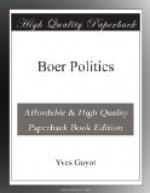“Nowhere had resentment
against ‘perfide Albion’ penetrated
national feeling more
deeply than in the Netherlands. Between the
Dutch and English characters
there is absolute incompatibility.”
As a rule, I attach little faith to such generalities; in this case, I am sure, rightly. Forgetting his dictum of “absolute incompatibility” (p. 449), Dr. Kuyper, at p. 520, shows that, as far as he is concerned, it is only relative; for in speaking of England, he goes on to say:—
“Were I not a Dutchman, I should prefer to be one of her sons. Her habitual veracity is above suspicion; the sense of duty and justice is innate in her. Her constitutional institutions are universally imitated. Nowhere else do we find the sense of self-respect more largely developed.”
Dr. Kuyper further admits that the “incompatibility” is relative as far as Afrikanders are concerned, it is only “absolute” as applied to the Boers. After giving us this example of the consistency of his views, Dr. Kuyper speaks of the English as being “unobservant.” A reproach somewhat unexpected, when directed against the countrymen of Darwin. As a proof, he presents us with this metaphor, equally unexpected from the pen of a Dutchman—a dweller of the plains:—
“Because, in winter, the English had only seen in these insignificant river beds a harmless thread of frozen water, they took no thought of the formidable torrent which the thawing of the snow, in spring, would send rushing down to inundate their banks.”
“The torrent” is of course the war now going on. Lord Roberts seems to be successfully coping with the “inundation.”
3.—"The Crime."
Dr. Kuyper approves of the “Petition of Rights” of 1881. It sets forth that the South African Dutch do not recognise the cession made by the King of Holland in 1814; it does not admit that he had the right to “sell them like a flock of sheep.” There have been Boers in rebellion since 1816.
One of these was a man named Bezuidenhout. In resisting a Sheriff who tried to arrest him, he was shot. His friends summoned to their aid a Kaffir Chief, named Gaika. The English authorities condemned five of the insurgents to be hanged. The rope broke. They were hanged over again.
Dr. Kuyper, and the “Petition of Rights” found their indictment of the British upon this event which they denominate “the Crime.” The scene of the execution was named “Slachtersnek,” “hill of slaughter.”
This act of repression was violent, but it may possibly have been indispensable. At any rate, it bears but a very far off relation to the events of to-day. Dr. Kuyper in resuscitating, and laying stress upon it, follows a method well known in rhetoric; he begins by discrediting his adversary. However, despite his good intentions, he has not increased our admiration for the Boers by pointing out to us that the most serious grievances they can allege against the English are the protection accorded by the latter to the natives and slaves, and the final emancipation of the latter.




